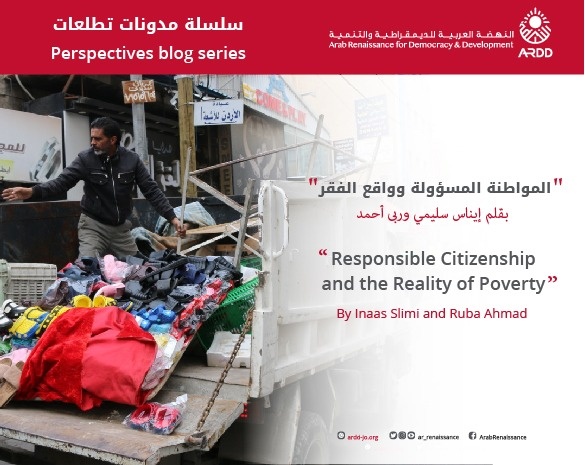By Inaas Slimi and Ruba Ahmad
The meaning of responsible citizenship — which perhaps can be framed as citizens having knowledge about their roles in their communities, countries and the world, as well as playing an active role in making the world a better place to live — seems to have acquired a more specific interpretation during the COVID-19 pandemic.
The widespread messages by international organizations, governments and individual citizens appear uncontested: by staying home, you save lives. Models of “flattening the curve” continue to be circulated, demonstrating that COVID-19 will peak and then decrease until the virus is fully controlled and defeated by a certain month, provided that individuals commit to the imposed measures by national authorities. Each citizen is considered to share responsibility in reducing the spread of the virus for the respective country and for the world at large. In some cases, this definition is broadened to include those who have elected to act as agents of change, advocating for social, economic, and environmental justice.
The COVID-19 pandemic, like every crisis, illustrates the many ways in which inequality colours reality. Variations of lockdowns and curfews are being instituted in different countries and governorates or municipalities, causing immediate, disruptive repercussions for businesses and economies at various levels. This disruption — accelerated and intensified by measures that restrict movement — leads to limited access to food supplies and healthcare facilities, essentially placing vulnerable communities in the impossible position of needing to choose between adhering to official response measures with the risk of lacking basic needs and deteriorating health conditions, or attempting to continue work and risking endangering public health and possibly punishment for violating government measures. Evidently, it is important to highlight the relevant risks for vulnerable communities in terms of COVID-19 precautionary and response measures.
It is also crucial to recognize the ways in which existing inequalities have the power to redefine this current reality for various groups, and to acknowledge that, for many, poverty is an obstacle to participating in what is deemed “responsible citizenship” during this crisis. So, what happens when “by staying home, you save lives” doesn’t seem to apply to your own life?
Without a shift in the paradigm of inequality, the seemingly simple prospect of a seasonal virus poses serious risks to the very systems under which the world is governed – most primarily, our public health and global economy. Beyond the very different ramifications of this crisis on people living in poverty, this situation serves as an opportunity to rethink the larger picture: what does “back to normal” imply once the pandemic ebbs away? Is it possible – or rather, acceptable – to return to the status quo upheld in the pre-coronavirus world?
Now, perhaps more than ever, the link between poverty levels worldwide and the importance of an efficient public health system has been exposed. It is time to conceive of “responsible citizenship” in a way that has the potential to achieve lasting change in the world through a collective sense of responsibility. Without this change – and without addressing underlying inequalities that influence vulnerability to crises in their many forms, the world can never be prepared to deal with inevitable shocks and changes.
Through the COVID-19 crisis, it has been evident that trust in governing institutions, access to quality services, and resilience at multiple levels are all central components of effective response. From education to healthcare to social protection to economics, the current circumstances have proven that responsible citizenship and responsible governance go hand in hand. At the global, regional, national, and local levels, it is evident that, moving forward, it is crucial to employ people-centred policies that inherently prevent suffering and vulnerability under any circumstances.


